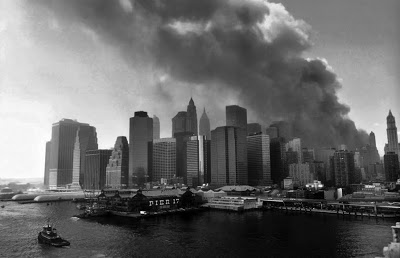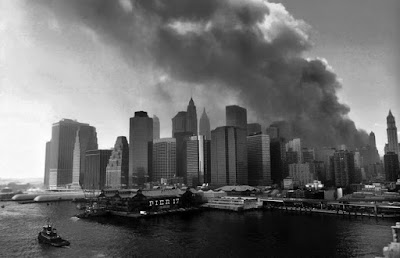
‘The crisis went to waste’
 |
| The New York City skyline on 11 September 2001. |
“Never let a serious crisis go to waste,” White House Chief of Staff Rahm Emanuel famously declared during the economic crisis of 2008.
What he did not say, but must have known, is that seven years earlier a serious crisis had indeed been squandered. In the wake of 9/11, the American people were primed to fight terrorism worldwide and to end America’s dependence on foreign oil. Rather than seizing that moment, however, it went to waste.
My family and I were in Jerusalem on 9/11. Watching the devastation on television, reading the local press, and speaking to Israeli friends, we heard repeatedly that 9/11 would be a game-changer. America, Israelis told us, finally “got it.” They felt sure that Washington would assume the lead in the global fight to end terror and would work to dry up its oil-based funding. Key beneficiaries of 9/11, they whispered, would be the Jewish people and the State of Israel.
That didn’t happen. Instead of fighting terror globally, America became mired in Afghanistan and Iraq. Instead of campaigning for energy independence, America became even more energy dependent than before.
As a result, the Jewish world and the State of Israel, like the United States and the free world as a whole, are neither stronger nor safer today than before 9/11. The global terror network lives on, funded in no small part by Middle East oil. The conclusion, from the perspective of 2011, is as inescapable as it is tragic: the crisis went to waste.
Jonathan D. Sarna is the Joseph H. & Belle R. Braun Professor of American Jewish History at Brandeis University and Chair of its Hornstein Jewish Professional Leadership Programme.
‘Terrorism as a global problem’ By Ilan Berman
It would be fair to say that, until September 11th, most Americans had little understanding of terrorism, or adequate appreciation for its destabilising potential.
The attacks on New York and the Pentagon changed all that, transforming an abstract danger into a tangible threat. In doing so, they generated new attention to —and sympathy with — Israel’s ongoing struggle with the same phenomenon.
The U.S. response to 9/11, however, has turned out to be only tangentially beneficial to Israel. That is because, over the past decade, American policy has focused overwhelmingly on al-Qaeda, Afghanistan and Iraq, and not the principal threats confronting the Jewish state.
These include Hezbollah, the Iranian sponsored, Syrian-supported Lebanese militia that former Deputy Secretary of State Richard Armitage once called the ‘A-Team’ of international terrorism. Today, Hezbollah is stronger than ever, having been rearmed by Iran since its 2006 war with Israel and now in virtual control of the Lebanese cabinet.
Likewise, Hamas remains committed to its goal of eradicating Israel and creating a Palestine that stretches ‘from the Jordan River to the Mediterranean Sea.’
Further afield, the gravest existential threat to Israel’s existence — Iran — continues to pursue a nuclear capability and support regional instability, in spite of Western sanctions. Moreover, in recent months, the ‘Arab Spring’ has injected new dangers into Israel’s security calculus, from the potential demise of longstanding security arrangements to the growing power of unfriendly Islamist movements.
In a tangible sense, therefore, Israel finds itself as insecure as it was on 10 September 2001. Over this past decade, the world has come to view terrorism as a global problem, rather than simply an Israeli one.
Ilan Berman is Vice President of the American Foreign Policy Council in Washington, D.C.
‘Never let our guard down’ By David Harris
September 11, 2001 is a date never to be forgotten. Above all, it is the nearly 3,000 victims, together with their families, whom we remember.
But then we also can’t forget that there was an ideology — a radical interpretation of Islam — fuelling the attacks. There were those who exulted as America was struck. The cheering chorus could even be found among pseudo-intellectual voices in Europe and the United States, who claimed that “America had it coming.”
Lessons for Israel and the Jewish people? Never let our guard down.Never suffer from a failure of imagination. Never go wobbly or show fear. Never forget that the enemies of the U.S. and Western values are the same enemies of Israel and the Jewish people — and vice versa. And never descend to the level of our foes. We will confront and defeat them, yes, but while steadfastly defending what they abhor most about us — our free and open societies.
Davis Harris is the executive director of the American Jewish Committee.










